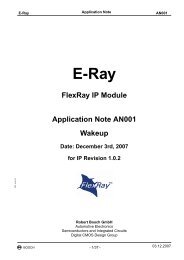Product catalog spring 2013 - Bosch Semiconductors and Sensors
Product catalog spring 2013 - Bosch Semiconductors and Sensors
Product catalog spring 2013 - Bosch Semiconductors and Sensors
You also want an ePaper? Increase the reach of your titles
YUMPU automatically turns print PDFs into web optimized ePapers that Google loves.
16 | Intellectual Property<br />
safe<br />
IP modules<br />
for networking applications<br />
M_CAN<br />
The M_CAN is a CAN IP module that can<br />
be realized as a st<strong>and</strong>-alone device, as<br />
part of an ASIC, or as a FPGA. The M _ CAN<br />
performs communication according to<br />
ISO 11898-1 (identical to <strong>Bosch</strong> CAN<br />
specification 2.0 parts A <strong>and</strong> B). For connection<br />
to the physical layer additional<br />
transceiver hardware is required.<br />
The message storage is intended to be a<br />
single- or dual-ported Message RAM outside<br />
of the module. It is connected to the<br />
M_CAN via the Generic Master Interface.<br />
Depending on the chosen integration,<br />
multiple M_CAN controllers can share<br />
the same Message RAM. The Host CPU<br />
is connected via the 32-bit Generic Slave<br />
Interface.<br />
For reception, up to 64 Rx Buffers <strong>and</strong> two<br />
Rx FIFOs for storage of up 64 messages<br />
each can be setup. Acceptance filtering<br />
is implemented by a combination of up to<br />
128 filter elements whereas each one can<br />
be configured as a range, as a bit mask,<br />
or as a dedicated ID filter. For transmission<br />
32 Tx Buffers are available. They can<br />
be configured as dedicated Tx Buffers, as<br />
part of a Tx FIFO, or as part of a Tx Queue.<br />
A Tx Event FIFO stores time stamp <strong>and</strong><br />
identifier of transmitted messages.<br />
For Altera FPGAs the Altera Avalon bus<br />
interface is provided, for Lattice FPGAs<br />
the Wishbone interface. They can easily<br />
be replaced by a user-defined module<br />
interface.<br />
C_TTCAN / M_TTCAN<br />
The C_TTCAN <strong>and</strong> M_TTCAN IP modules<br />
are Time Triggered CAN IP modules<br />
derived from the C_CAN <strong>and</strong> M_CAN IP<br />
modules. The TTCAN IP modules perform<br />
communication according to ISO 11898-1<br />
(identical to <strong>Bosch</strong> CAN specification<br />
2.0 parts A <strong>and</strong> B) <strong>and</strong> according to ISO<br />
11898-4 (Time Triggered Communication<br />
on CAN). They are intended for lowcost<br />
time triggered applications with bit<br />
rates up to 1Mbit/s. Both TTCAN IP modules<br />
are also available for Altera <strong>and</strong> Lattice<br />
FPGA.<br />
LIN Communication Controller Module<br />
(C_LIN)<br />
The C_LIN IP module is targeting low cost<br />
LIN slave designs. The C_LIN module is an<br />
autonomous LIN 1.3 or 2.1 protocol controller<br />
with embedded message h<strong>and</strong>ling<br />
for integration in a system on chip. It is<br />
described in VHDL on RTL level, prepared<br />
for synthesis.<br />
Outputs from the receive message<br />
buffers can be used to directly control<br />
application blocks. Vice versa, inputs<br />
from the application layer can be directly<br />
connected as inputs to the transmit message<br />
buffers. Easy configuration methods<br />
enable the adaption of the module to specific<br />
applications for optimized designs.


